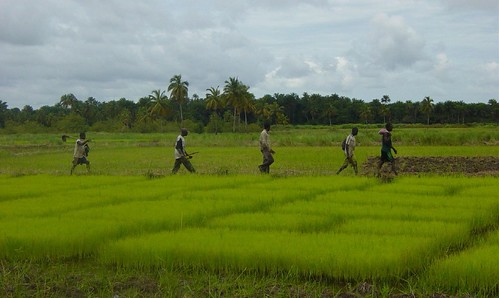The great global land grab
Posted by Big Gav in africa, agriculture
Energy Bulletin has an article on foreign efforts to acquire chunks of Africa for food production - The great global land grab.
News of another big land deal between a rich nation and a poor developing country is becoming a common occurrence. In August a group of Saudi investors said that they would be investing $1 billion in land in Africa for rice cultivation. They are calling it their ‘7x7x7 project’, since they are aiming to plant 700,000 hectares of land to produce seven million tonnes of rice in seven years. The land will be distributed over several countries: Mali, Senegal and maybe Sudan and Uganda.
A few weeks earlier South Korea acquired 700,000 hectares of land in Sudan, also for rice cultivation. India is funding a large group of private companies to buy 350,000 hectares in as-yet unspecified countries in Africa. A group of South African businessmen is negotiating an 8 million hectare deal in the Democratic Republic of Congo. And so it goes on. The United Nations believes that at least 30 million hectares (about 74 million acres, well over the size of the UK) were acquired by outside investors in the developing world during the first half of this year alone.
The land grab was indirectly spawned by the international financial crisis. It’s interesting to trace the investors’ train of thought because it says a lot about the kind of world we’re heading towards. Some two years ago many financial players – the investment houses that manage workers’ pensions, private equity funds, hedge funds, big grain traders and so on – saw that the sub-prime mortgage bubble was about to burst and moved money into the safer commodities market. Although there was no real shortage of food, food prices (especially of cereals, but also of dairy and meat) rose dramatically.
Countries dependent on food imports were badly hit, with a big increase in the domestic price of some food staples, particularly rice. People coped by changing their eating habits, in many cases cutting back on meals, but they also took to the streets to demand government action. By early 2008 riots had broken out in nearly 40 countries, instilling fear among the world’s political elite. Panic-stricken governments rushed to increase their food imports, leading several food-producing nations to restrict exports, fearful that they too could be hit by shortages.
The big winners from the crisis were not the farmers, as one might have expected. They enjoyed a big increase in the prices they were paid at the farm gate, but all their potential income gains were gobbled up by higher production costs. The people who made a real killing were the suppliers of agricultural inputs. With their quasi-monopoly control over seeds, pesticides, fertilisers and machinery, these giant companies made obscene profits out of the higher prices squeezed out of largely poor populations.
Close on their heels in the ranking of the profiteers came the world’s largest grain traders. These companies played a role in artificially creating the food scare in the first place, so they made sure they were well placed to profit from it. Cargill, the world’s largest grain trader, reported an increase in profits in 2008 of nearly 70 per cent over 2007, a 157 per cent rise in profits since 2006. Profits for ADM, the world’s second largest grain trader, showed a lower rate of increase in 2008, partly because of its heavy investments in the sinking ethanol market, but the company’s profits were still more than 200 per cent higher than they were in 2006.






